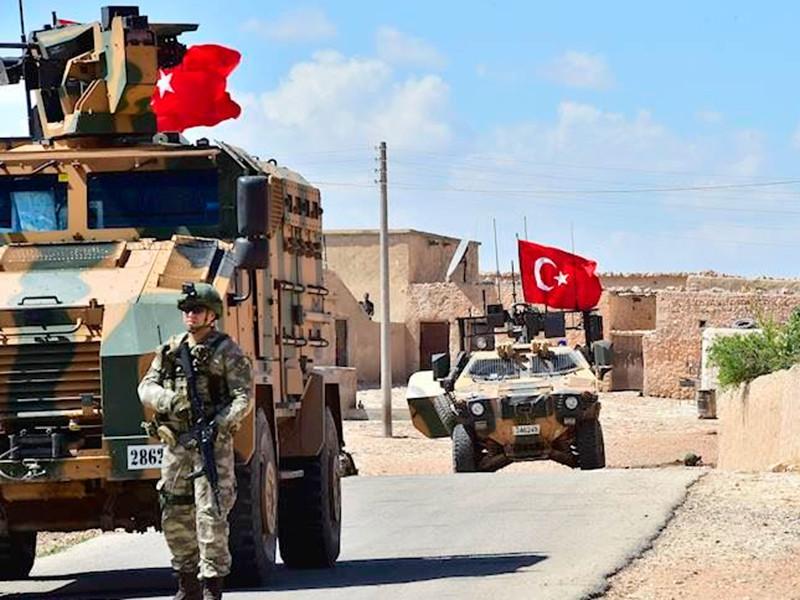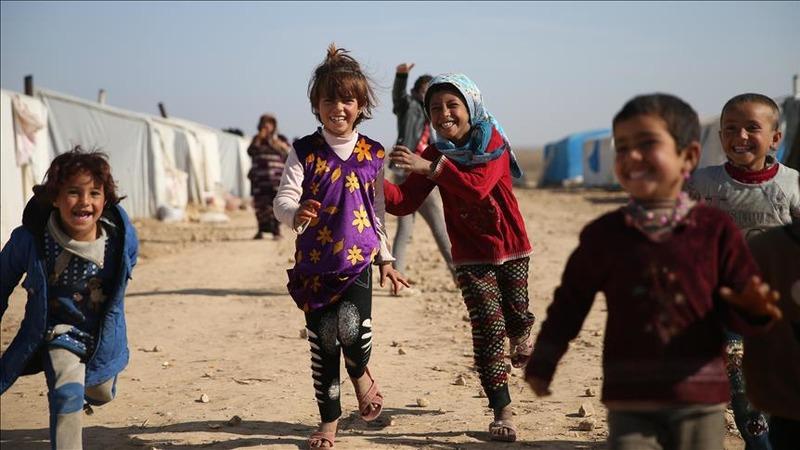Erdogan's reconciliation with Assad and Türkiye's military operation in Syria Review by Maxim Petrov
The talks on the Turkish military operation in Northern Syria have been going on for quite a long time. In recent weeks, there has been an increase in discussions about a possible reconciliation between Türkiye and the regime of Syrian President Bashar al-Assad.
In Syria's civil war, Iran and Russia are siding with Assad, providing him with weapons, fuel, and other aid, while Türkiye has given weapons to various anti-Assad groups and even helped them unite to form the Syrian National Army, the SNA. In addition, there are Turkish troops in a number of areas in northern Syria. This confrontation has repeatedly taken the form of direct armed conflict, in which Turkish and Russian units have been involved.

At the same time, there are armed groups of Kurds and close Arab tribes, united under the banner of the SDF (Syrian Democratic Forces) in the north, north-east, and east of Syria. They are based on the Kurdish People's Self-Defence Units (YPG). Türkiye seeks to destroy or weaken these groups, as it believes they are under the PKK (Kurdistan Workers' Party), officially recognized as a terrorist organization in Türkiye. The PKK is also active in northern Iraq, in the Qandil Mountains (where their main headquarters are located). Accordingly, PKK is trying to build a solid bastion along the borders with Türkiye in Iraq and Syria, and the Turkish government is trying, on the contrary, to oust Kurds from these areas, and constantly carries out military operations against them in northern Iraq and in northern Syria. The SNA units are actively participating in them (on Türkiye's side). But the possibility of a large-scale Turkish operation to completely displace Kurdish armed formations from northern Syria has been discussed for quite some time.
For Türkiye, the matter is complicated by the fact that in some Kurdish-occupied territories in northern Syria there are American troops (about a thousand military personnel), and in other areas the official Syrian armed forces (and there are also or may be some Russian formations and pro-Iranian militias supporting Assad). Therefore, without the consent of Washington, Moscow, Tehran, and Damascus, it is difficult for Ankara to conduct such operations in this region.
Recently, however, there have been signs that Türkiye may move to re-establish relations with Assad. This came after talks between Putin and Erdogan in Sochi on August 5. According to media reports, Russia is actively encouraging Türkiye to enter into an agreement with Assad. Moscow maintains strong economic ties with Türkiye, including continued deliveries of S-400 air defence systems, oil, and gas, as well as the $22 billion Akkuyu nuclear power plant. Moreover, the Kremlin is transferring billions of dollars to Türkiye for the construction of the nuclear power plant, which is important for the Turkish economy currently experiencing financial difficulties. Moscow's investment supports the Turkish lira. So, Russia's opinion is listened to by Türkiye's leadership.
All of this led to the announcement last week by Turkish foreign minister Mevlut Cavusoglu that he had spoken to his Syrian counterpart during an international meeting in Belgrade and pointed out the need for reconciliation between the Syrian opposition and the government. Cavusoglu's words sparked a storm of protests and loud demonstrations by the Syrian opposition, after which the head of Turkish diplomacy remarked that he was not talking about reconciliation but about compromise. Later, when asked whether Turkish President Recep Tayyip Erdogan would meet with Bashar al-Assad, the deputy chairman of Türkiye's ruling Justice and Development Party Hayati Yazıcı remarked: "I cannot say it will never happen."

Al-Monitor, which specializes in Middle East analysis, points out that Erdogan is a master of this kind of foreign policy twist. For example, he has cooperated with Israel and Egypt after years of acute confrontation with these countries, and shook hands with Saudi Crown Prince and de facto ruler Mohammed bin Salman after pointing out his role in the murder of Saudi journalist Jamal Khashoggi.
Contacts between Turkish intelligence chiefs and Assad's intelligence services have taken place before. However, for the first time, there are signs that Türkiye's reconciliation with Assad is becoming something real. Ankara's aims are clear. It would like to get the green light from Moscow and Damascus for an operation against the Kurds in northern Syria and is also interested in continuing economic cooperation with Russia. However, it is not just about confronting the PKK, but also about the fact that three-quarters of Turkish citizens support anti-Kurdish operations. Furthermore, Erdogan would like to return at least some of the nearly 4 million Syrian refugees to Syria - between 60 and 80 per cent of Turkish citizens oppose the migrants and demand their return home, while the huge birth rate of Syrian families could change the demographic situation in the country, which, according to the Turkish side, is undesirable. Erdogan would like to resolve all these issues before Türkiye's elections in 2023. But in practice, agreeing with Assad on an operation against Kurdish militias and on the return of refugees would be very difficult to do. And there are many reasons for this.
First and foremost, Assad demands the withdrawal of all Turkish troops from Syrian territory. This is the only condition on which Damascus intends to negotiate with Ankara. But from Ankara's point of view, this demand is impossible to meet: as soon as Türkiye does this, the Assad regime will immediately try to destroy the opposition and launch an offensive on all the areas it controls. That is how Assad acted in the past, and there is no reason to believe that he will act differently in the future. And if that happens, Türkiye will lose its main ally in Syria and all of its trump cards.
Türkiye, for its part, is demanding a 32-kilometre security zone along the 800-kilometre-long Turkish-Syrian border, the withdrawal of Kurdish militias and the settlement of a million Syrian refugees there. Moreover, Turkish diplomats are offering Assad to return to the 1998 Adan agreement between Ankara and Damascus, but with a change in its terms. Türkiye would like Damascus to agree to the right to pursue PKK groups on Syrian territory to a depth of 32km, instead of the 5 stipulated in the agreement. In effect, this would mean Turkish control over part of Syria's territory. Assad is unlikely to accept this.
Türkiye wants the opposition, including the armed units of the SNA, and the Assad regime to agree on peaceful coexistence and political activities, i.e. the opposition will return to Damascus and the regime will gain representation in Idlib, Jarablus, and other areas currently controlled by Türkiye and pro-Turkish forces. Such a development seems unlikely. In Idlib, there is total hatred for the supporters of Assad (the city and the region have been hit hard by their shelling, moreover, half of its population are refugees from other parts of Syria who fled the government forces) and, on the other hand, since the start of the civil war, Assad has only been busy killing members of the opposition and has shown no signs of being ready for peaceful co-existence with them, such as in the framework of multi-party parliamentary elections. Several opposition groups have achieved reconciliation with Assad in the south, but this has been followed by arrests and armed clashes.
Türkiye is keen to bring Syrian refugees back home, not only to the 32km zone but also to Aleppo, Homs, and Hama. At the same time, the return of refugees to Syria looks unrealistic at once for a number of reasons. Refugees are not returning from Türkiye, Jordan, Lebanon, and elsewhere because they are being arrested, tortured, executed, and robbed at home by the armed forces of the Assad regime and loyalist militias. This is a widespread practice - if it were otherwise, many would have returned long ago.

But there is a second reason. The vast majority of Syrians have become deeply rooted in Turkish society over the past decade. Millions of Syrians have taken jobs in Turkish factories, opened their own cafes, or even engaged in international trade. Syrian businesses are flourishing in Türkiye and have already opened some 10,000 companies officially there, but observers believe there are several times as many unofficial Syrian firms. Using their connections in the Arab world, enterprising Syrian businessmen have taken to exporting. Many of them thrive because it is easy for them to hire Syrian refugee workers who are willing to do any job. Around a million Syrian children go to Turkish schools and many of them no longer speak Arabic. Türkiye is unlikely to ever get them resettled in Syria, both because they are deathly afraid to return and because they are increasingly integrated into Turkish society.
Elizabeth Tsurkov, a doctoral student at Princeton University and an expert on Syria, believes that Erdogan's reconciliation with Assad is unrealistic. "What would prevent such a deal is the absolutely uncompromising position of the Syrian regime, which would not want to give Türkiye any security guarantees and which is also incredibly weak militarily," Tsurkov told Al-Monitor. - Even if Assad wanted to contain the PKK, he does not have the military capacity to do so now. And, of course, any guarantees the Assad regime can give to the people of north-west and north-east Syria are meaningless." According to her, Assad's security forces will go after anyone perceived as an enemy in areas outside his control if there is any division of Kurdish territories between Ankara and Damascus. Therefore, Syrians living in these territories will try to flee from the Assad regime forces. There would be a new mass exodus of Syrians to Türkiye, which would either have to be met with live ammunition at the border or that mass of refugees would move to Türkiye, as Tsurkov notes. Both exoduses would be utterly disastrous for any Turkish government and would deal a mortal blow to its image.
Finally, Türkiye needs to get the go-ahead for an operation against the Kurds from the United States as well. But Washington refuses to give the green light, mainly on the grounds that it will distract attention from the fight against ISIS, which it is conducting jointly with Kurdish formations.
For all these reasons, reconciliation between Assad and Erdogan currently does not look too likely. For all these reasons, a reconciliation between Assad and Erdogan does not look very likely at the moment. But the Middle East is unpredictable and President Erdogan is known for his sharp political turnarounds, so it cannot be completely ruled out either.








